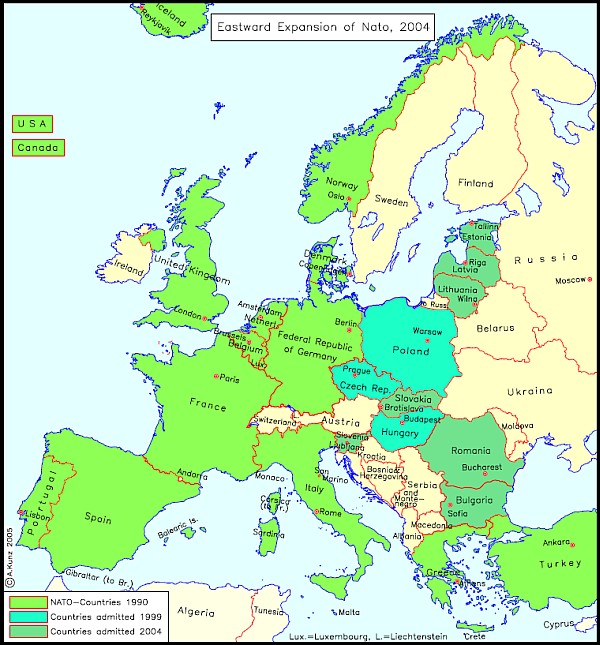
NATO
By
James Joyner
Foreign Policy, April 15, 2011
Edited by Andy Ross
The NATO alliance represents the developed world. Operating under its name
confers a legitimacy that national flags don't. In its 62 years of
existence, the alliance has deployed its might sparingly for operations with
widespread international approval.
In the case of Libya, the NATO
aegis takes much of the edge off the use of hard power. It demonstrates that
humanitarian interest, not a thirst for foreign oil, is the motivation for
action. The call for action by the Arab League and the imprimatur of the UN
Security Council provided additional cover.
NATO has made sure that
different countries' command structures and systems can work together.
Alliance members train together and fight together. While an American has
always been supreme allied commander for Europe, major operations have been
commanded by generals and admirals from almost all major NATO partners.
NATO's engagement in Libya shows that the alliance has a place in the
post-Cold War world. In 1993, U.S. Senator Richard Lugar famously declared
that NATO must go out of area or out of business. Otherwise, there was
little incentive for the United States to invest in an alliance that would
not be able to fight outside Europe. Then NATO conducted several operations
in the Balkans. In those wars as in Libya today, after an initial lead role
during intense air operations, the United States handed over to the
Europeans.
The post-9/11 mission in Afghanistan proved NATO's
relevance beyond Europe. For the first time ever, NATO invoked Article 5,
which said that an armed attack on one member be treated as an attack on
all. The glow faded in Afghanistan as the mission of retaliating against
those who had attacked a member state morphed into one of nation-building.
Many allies have pulled their forces out entirely.
Many NATO members
are highly dubious of intervention in Libya's civil war. But once the United
States, Britain, and France decided to intervene, NATO was the platform. The
chief issue underlying NATO's problems in Libya is lack of consensus on the
desired end state. The limitations are not the fault of NATO but rather of
the United Nations.
NATO faces the problem that the Europeans are
unwilling to adequately fund their own militaries. Instead, they allow the
Americans shoulder the burden. The British and French still see themselves
as world powers, but NATO remains dependent on the United States to do the
heavy lifting. Maybe Libya will be a wake-up call for Europeans.
AR Well said, James.
